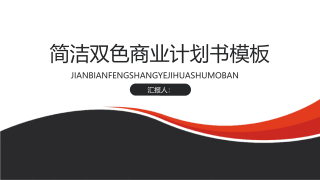组织支持感、自我效能感与工作绩效的关系研究
VIP免费
浙江财经学院硕士学位论文
I
摘 要
企业的持续稳定发展取决于其绩效水平的不断提高,而企业的绩效是由员工
的工作绩效来实现的。进入人本管理时代,员工-组织关系的研究越来越受到学术
界学者们的关注。为此,本文从员工-组织关系的微观层面入手,研究组织支持感
与工作绩效的关系。以往的研究大都注重组织支持感与工作绩效的直接作用,很
少研究组织支持感对工作绩效的间接作用。因此,本文以企业员工为研究对象,
详细分析了组织支持感对工作绩效的直接和间接效应,检验了自我效能感的中介
作用,将组织支持感、自我效能感与工作绩效纳入到统一的分析框架内,更加清
晰的描述组织与员工的关系。
本文采用文献研究、访谈与问卷调查三种方法对研究变量进行理论模型构建
和实证分析。首先,通过文献研究,构建本文的理论模型。其中,组织支持感可
划分为三个维度:工作支持、价值认同和关心利益;自我效能感是个体对自身完
成某一任务的信念,是一个心理学概念;工作绩效包含任务绩效和周边绩效两个
维度。在此基础上,提出了本文的初步研究模型。其次,为了保证理论模型与实
际相符,进行半结构化访谈,并根据访谈结果对理论模型进行修善,提出相应的
研究假设,为实证分析打下基础。然后,运用信度与效度分析、相关与回归分析
等数据处理方法,验证本文的理论模型及研究假设。
通过研究分析,本文主要结论如下:
第一,组织支持感正向影响工作绩效。其中,工作支持、价值认同和关心利
益对任务绩效有显著正向影响。工作支持和价值认同对周边绩效有显著正向影响。
其中,关心利益对任务绩效的影响最大,价值认同对周边绩效的影响最大,而关
心利益与周边绩效的影响不显著。
第二,组织支持感正向影响自我效能感。工作支持、价值认同和关心利益均
对自我效能感有显著正向影响。其中,价值认同对自我效能感的影响最显著。
第三,自我效能感正向影响工作绩效。自我效能感对任务绩效与周边绩效都
产生显著正向影响。
第四,自我效能感在组织支持感与工作绩效关系之间存在中介作用。自我效
能感在工作支持、价值认同、关心利益与任务绩效之间起到部分中介作用,在工
作支持、价值认同与周边绩效之间起到部分中介作用。自我效能感在关心利益与
周边绩效之间不存在中介作用。
本文的理论价值在于,一是从员工-组织关系的微观层面,侧重组织对员工的
浙江财经学院硕士学位论文
II
支持与承诺,研究组织支持感与工作绩效的关系,丰富了员工-组织关系的内容;
二是将自我效能感作为中介变量,加强组织支持感、自我效能感与工作绩效之间
的关系研究,验证组织支持感对工作绩效的直接效应与间接效应。
此外,本文对研究结果进行探讨,并针对研究结论提出了管理建议:第一,
加强组织目标管理建设,将个人目标与组织目标结合起来,使员工对自己的工作
任务更加明确,增强了员工工作的自主性,有利于提高工作绩效。目标管理作为
一种“以人为本”的管理制度,增加组织对员工的支持及员工工作的自我效能感;
第二,建立合理的薪酬制度,及时对员工做出的贡献给予奖励,使员工感受到组
织对其的认可与关心,从而激励员工积极工作,提高工作绩效;第三,加强企业
文化建设,构建反馈机制,保持组织与员工之间信息传递的畅通及交流沟通的便
利,促使组织、员工关系更加和谐,提高员工工作的积极性、自信心;第四,企
业应不定时地对员工进行培训,提升员工的工作技能,拓宽员工的知识水平,增
强员工工作的胜任力与自我效能感,从而更加有效地提高员工的工作绩效。
关键词:员工-组织关系;组织支持感;自我效能感;工作绩效
浙江财经学院硕士学位论文
III
ABSTRACT
Sustained and stable development of enterprises depends on the continuous
improvement of its level of performance. However, the performance of the enterprise is
realized by the employee's job performance. Enter the age of Humanistic Management,
the study of employee - organization relationships has attracted more and more
attention on academic scholars. This paper, from the micro-level of employee -
organization relationships, studies the relationship between perceived organizational
support and job performance. Most of the previous research focused on the direct
effects of perceived organizational support and job performance, few studies concerned
about the indirect effects of perceived organizational support and job performance.
Therefore, this paper, choosing the employees as the research object, explores in depth
the direct and indirect effects of perceived organizational support on job performance,
testing the intermediary role of self-efficacy. This study puts the perceived
organizational support, self-efficacy and job performance into a integrate framework to
describe the relationship between the organization and employees more clearly.
This paper applies three methods: the literature research, depth interviews and
questionnaires survey, to study theoretical model and empirical analysis. First, through
literature research, the paper builds a theoretical model. The perceived organizational
support can be divided into three dimensions: work support, value recognition and
concern for the interests. Self-efficacy, as a psychological concept, is the belief of the
individual to complete a task. Job performance includes two dimensions of task
performance and contextual performance. On the basis of the views above, the theoretical
model is proposed. Secondly, in order to guarantee the theoretical model is consistent with
the practical, the paper introduces semi-structured interviews to revise theoretical
model, and proposes research hypotheses, which lays the foundation for the empirical
analysis. Then, this study deals with the data collected by factor analysis, correlation
and regression analysis and other methods to verify theoretical models and hypotheses.
Through research and analysis, the main conclusions of this paper are as follows:
First, perceived organizational support has positive effects on job performance.
Work support, value recognition and concern for the interests have positive effects on
task performance. Work support and value recognition have positive effects on
浙江财经学院硕士学位论文
IV
contextual performance. Concern for the interests makes the largest contribution to
task performance, value recognition makes the largest contribution to contextual
performance, but concern for the interests did not affect the contextual performance.
Second, perceived organizational support positively affects self-efficacy. Work
support and value recognition have positive effects on self-efficacy. And value
recognition makes the largest contribution.
Third, self-efficacy has positive effects on job performance. And self-efficacy
positively affects task performance and contextual performance.
Fourth, self-efficacy has an intermediary role between perceived organizational
support and job performance. Self-efficacy is a partial mediator between work support,
value recognition, concern for the interests and task performance, a partial mediator
between work support, value recognition and contextual performance. But mediating
effect between concern for the interests and contextual performance does not exist.
There are two aspects theoretical value in this paper. On the one hand, from the
micro-level, it enriches the content of employee - organization relationships, and to
study the influence between perceived organizational support and job performance. On
the other hand, this paper uses self-efficacy as a mediating variable, so as to emphasize
the relationships among three variables and to verify the direct and indirect effects to
perceived organizational support on job performance.
Finally, based on these results, the following recommendations are proposed: First,
emphasize construction of management by objectives. Combining personal goals with
organizational goals, making employees’ tasks more clearly, to enhance the autonomy
of the employees work, and help to improve job performance. Management by
objectives, as a "people-oriented" management system, increases the organizational
support and self-efficacy. Second, establish a reasonable system of remuneration. The
organization pay employees timely when they contribute to better performance and it
will motivate employees to improve their performance. Third, strengthen construction
of corporate culture; build a feedback mechanism to maintain the information transfer
quickly and communication smoothly, enhance enthusiasm and self-confidence. Fourth,
enterprise should arrange staff training to enhance skills and broaden knowledge level;
improve employee competency, self-efficacy and increase employee job performance.
Key words: employee - organization relationships; perceived organizational support;
self-efficacy; job performance
浙江财经学院硕士学位论文
V
目 录
第一章 绪论 .................................................................................................................... 1
第一节 研究背景、目的和意义 ............................................................................. 1
第二节 研究的内容与方法 ..................................................................................... 2
第三节 研究的创新点 ............................................................................................. 5
第二章 文献综述 ............................................................................................................ 6
第一节 组织支持感研究综述 ................................................................................. 6
第二节 自我效能感研究综述 ............................................................................... 12
第三节 工作绩效研究综述 ................................................................................... 14
第四节 文献综述小结 ........................................................................................... 20
第三章 研究模型构建与假设 ...................................................................................... 22
第一节 影响路径分析 ........................................................................................... 22
第二节 研究模型构建与访谈检验 ....................................................................... 23
第三节 研究假设 ................................................................................................... 25
第四章 问卷设计与数据收集 ...................................................................................... 29
第一节 研究变量测量 ........................................................................................... 29
第二节 问卷设计 ................................................................................................... 31
第三节 数据收集 ................................................................................................... 32
第五章 数据处理与实证分析 ...................................................................................... 34
第一节 描述性统计分析 ....................................................................................... 34
第二节 效度分析 ................................................................................................... 35
第三节 信度分析 ................................................................................................... 39
第四节 人口统计特征与研究变量的关系分析 ................................................... 40
第五节 研究变量的相关分析 ............................................................................... 44
第六节 研究变量的回归分析 ............................................................................... 45
第七节 自我效能感的中介作用分析 ................................................................... 48
第八节 研究结果汇总 ........................................................................................... 51
第六章 研究结果讨论与结论 ...................................................................................... 52
第一节 研究变量之间的关系讨论 ....................................................................... 52
第二节 人口统计变量的差异性讨论 ................................................................... 54
第三节 研究结论 ................................................................................................... 56
浙江财经学院硕士学位论文
VI
第七章 研究总结 .......................................................................................................... 58
第一节 理论价值与管理启示 ............................................................................... 58
第二节 研究局限与展望 ....................................................................................... 60
参考文献 ........................................................................................................................ 62
附录一 ............................................................................................................................ 67
附录二 ............................................................................................................................ 69
致 谢.............................................................................................................................. 70
浙江财经学院硕士学位论文
VII
表目录
表2-1 组织支持感对员工态度和行为的影响....................................................... 9
表2-2 工作绩效定义............................................................................................. 15
表3-1 研究变量定义汇总..................................................................................... 24
表4-1 组织支持感测量条目................................................................................. 29
表4-2 自我效能感测量条目................................................................................. 30
表4-3 工作绩效测量条目..................................................................................... 31
表5-1 样本基本情况统计表................................................................................. 34
表5-2 组织支持感的效度分析表......................................................................... 36
表5-3 自我效能感的效度分析表......................................................................... 37
表5-4 量表修正后的自我效能感的效度分析表................................................. 38
表5-5 工作绩效的效度分析表............................................................................. 38
表5-6 研究变量信度系数表................................................................................. 40
表5-7 不同性别的独立样本T检验 ...................................................................... 40
表5-8 不同年龄阶段各变量的描述性统计分析................................................. 41
表5-9 不同年龄的单因素方差分析..................................................................... 41
表5-10 不同教育程度的各变量描述性统计分析............................................... 42
表5-11 不同教育程度的单因素方差分析 ........................................................... 42
表5-12 不同工作年限在的各变量描述性统计分析........................................... 43
表5-13 不同工作年限的单因素方差分析........................................................... 43
表5-14 研究变量的相关分析............................................................................... 44
表5-15 研究变量各维度的相关分析................................................................... 44
表5-16 组织支持感对工作绩效的回归分析....................................................... 45
表5-17 组织支持感各维度对工作绩效各维度的回归分析............................... 45
表5-18 组织支持感对自我效能感的回归分析................................................... 47
表5-19 组织支持感各维度对自我效能感的逐步多元回归分析....................... 47
表5-20 自我效能感对工作绩效及其各维度的回归分析................................... 48
表5-21 自我效能感对组织支持感与工作绩效的中介作用分析结果表........... 49
表5-22 自我效能感对组织支持感各维度与任务绩效的中介作用分析结果表50
表5-23 自我效能感对组织支持感各维度与周边绩效的中介作用分析结果表50
表5-24 假设验证结果........................................................................................... 51
浙江财经学院硕士学位论文
VIII
图目录
图1-1 研究技术路线图........................................................................................... 4
图3-1 研究影响路径图......................................................................................... 23
图3-2 研究模型..................................................................................................... 24
图5-1 中介变量作用示意图................................................................................. 49
图6-1 组织支持感对工作绩效直接作用示意图................................................. 57
图6-2 组织支持感对工作绩效间接作用示意图................................................. 57
摘要:
展开>>
收起<<
浙江财经学院硕士学位论文I摘要企业的持续稳定发展取决于其绩效水平的不断提高,而企业的绩效是由员工的工作绩效来实现的。进入人本管理时代,员工-组织关系的研究越来越受到学术界学者们的关注。为此,本文从员工-组织关系的微观层面入手,研究组织支持感与工作绩效的关系。以往的研究大都注重组织支持感与工作绩效的直接作用,很少研究组织支持感对工作绩效的间接作用。因此,本文以企业员工为研究对象,详细分析了组织支持感对工作绩效的直接和间接效应,检验了自我效能感的中介作用,将组织支持感、自我效能感与工作绩效纳入到统一的分析框架内,更加清晰的描述组织与员工的关系。本文采用文献研究、访谈与问卷调查三种方法对研究变量进行...
相关推荐
-
陶瓷化防火耐火聚烯烃电缆料创业计划书VIP免费
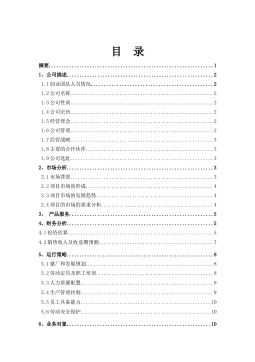
 2025-01-09 13
2025-01-09 13 -
陶瓷饰品创业计划书VIP免费
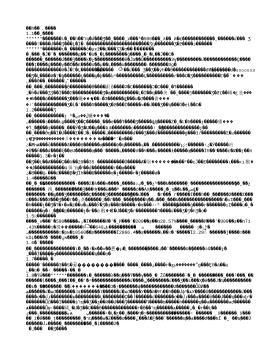
 2025-01-09 21
2025-01-09 21 -
陶瓷项目简介VIP免费
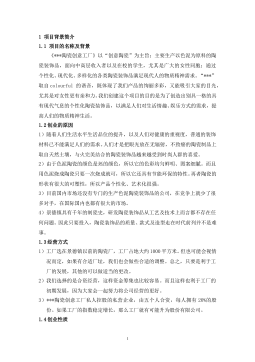
 2025-01-09 12
2025-01-09 12 -
陶瓷艺术精品销售计划书VIP免费
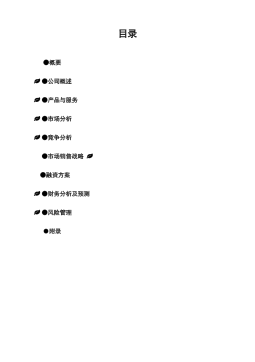
 2025-01-09 11
2025-01-09 11 -
陶艺DIY策划书VIP免费
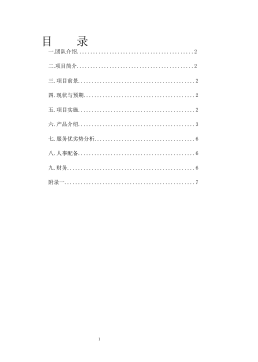
 2025-01-09 12
2025-01-09 12 -
陶艺DIY创业项目计划书VIP免费
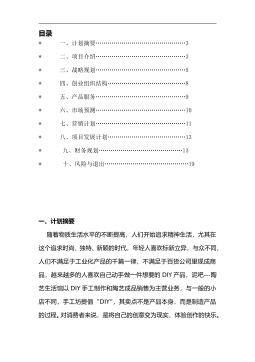
 2025-01-09 9
2025-01-09 9 -
陶艺Style策划书VIP免费
 2025-01-09 11
2025-01-09 11 -
陶艺创业指导书VIP免费
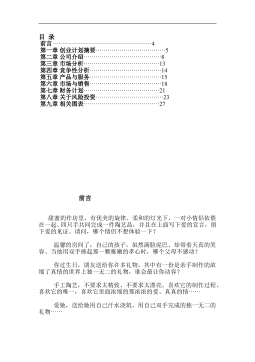
 2025-01-09 14
2025-01-09 14 -
陶艺花卉计划书VIP免费
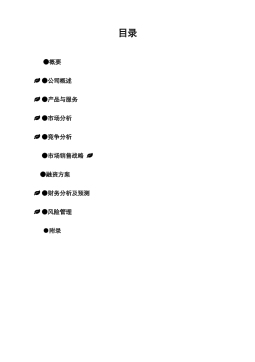
 2025-01-09 11
2025-01-09 11 -
网上陶瓷商店创业计划书VIP免费

 2025-01-09 8
2025-01-09 8
作者:周伟光
分类:高等教育资料
价格:15积分
属性:74 页
大小:618.82KB
格式:PDF
时间:2024-09-30


